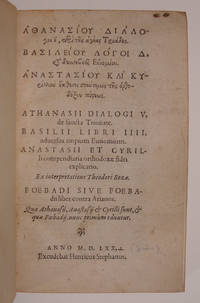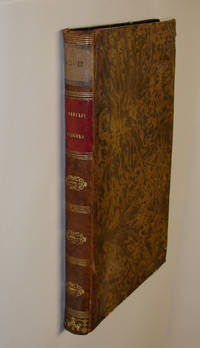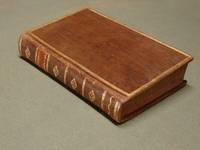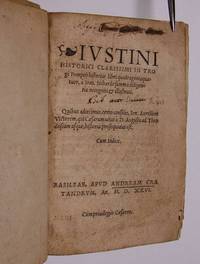
Athanasiou dialogoi e', peri tês hagias Triados. Basileiou logoi d' kata dussebous Eunomiou. Anastasiou kai Kurillou ekthesis suntomos tês orthodoksou pisteôs. Athanasii dialogi V, de sancta Trinitate. Basilii libri IIII, adversus impium Eunomium. Anastasii et Cyrilli compendiaria orthodoxae fidei explanatio. Ex interpretatione Th. Bezae. Foebadi, sive Foebadii liber contra Arianos. Quae Athanasii, Anastasii & Cyrilli sunt, & quae Foebadii, nunc primum eduntur.
de ATHANASIUS & BASILIUS
- Usado
- Tapa dura
- Estado
- Ver descripción
- Librería
-
AMSTERDAM, Netherlands
Formas de pago aceptadas
Sobre este artículo
Reseñas
(¡Iniciar sesión or Crear una cuenta primero!)
Detalles
- Librería
- Antiquariaat Fragmenta Selecta
(NL)
- Inventario del vendedor #
- 120334
- Título
- Athanasiou dialogoi e', peri tês hagias Triados. Basileiou logoi d' kata dussebous Eunomiou. Anastasiou kai Kurillou ekthesis suntomos tês orthodoksou pisteôs. Athanasii dialogi V, de sancta Trinitate. Basilii libri IIII, adversus impium Eunomium. Anastasii et Cyrilli compendiaria orthodoxae fidei explanatio. Ex interpretatione Th. Bezae. Foebadi, sive Foebadii liber contra Arianos. Quae Athanasii, Anastasii & Cyrilli sunt, & quae Foebadii, nunc primum eduntur.
- Autor
- ATHANASIUS & BASILIUS
- Estado del libro
- Usado
- Encuadernación
- Tapa dura
- Palabras clave
- (Oude Druk) (Rare Books) Anastasius Athanasius Basilius Cyrillus Eunomius Foebadius Greek text Latin translation Patristics Patristik Stephanus Swiss imprints Theodorus Beza editio princeps Étienne
- Catálogos del vendedor
- Old and Rare books;
Términos de venta
Antiquariaat Fragmenta Selecta
Books may be returned for any reason within 14 days of receipt. The book price will be refunded, if the book is returned in the same condition as sent, and packed, shipped and insured as received. A full refund including shipping costs will follow only if an item arrives misdescribed or damaged. Shipping estimates are based on books weighing 4.4 LB or 2 KG. If your book order is heavy or oversized, we will email you to let you know that extra shipping is required. All books are in good antiquarian condition, unless otherwise described. Items offered are subject to prior sale.
Sobre el vendedor
Antiquariaat Fragmenta Selecta
Sobre Antiquariaat Fragmenta Selecta
Glosario
Algunos términos que podrían usarse en esta descripción incluyen:
- Morocco
- Morocco is a style of leather book binding that is usually made with goatskin, as it is durable and easy to dye. (see also...
- New
- A new book is a book previously not circulated to a buyer. Although a new book is typically free of any faults or defects, "new"...
- Vellum
- Vellum is a sheet of specialty prepared skin of lamb, calf, or goat kid used for binding a book or for printing and writing. ...
- Edges
- The collective of the top, fore and bottom edges of the text block of the book, being that part of the edges of the pages of a...
- Spine
- The outer portion of a book which covers the actual binding. The spine usually faces outward when a book is placed on a shelf....
- Gilt
- The decorative application of gold or gold coloring to a portion of a book on the spine, edges of the text block, or an inlay in...
Categorías de este libro
Also Recommended
-

¡Ahorra un 10% en cada compra!
Únete al Biblioclub y empieza a ahorrar un 10% enn todas tus compras.
$29.95 / Año






